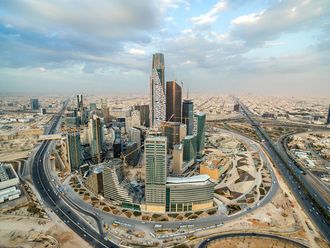
Recently I attended a conference in Ankara about oil and gas expansion in Turkey where many presentations about energy and their relationships to regional or international issues were discussed.
Turkey's indigenous oil and gas resources are limited and the country depends on imports for as much as 90 per cent of its requirements. While there is a huge effort by Turkish Petroleum (TPAO) company and its associates of international companies for onshore and offshore exploration, especially in the Black Sea, no one expects the overall picture to change in the future.
But the most overriding aspect discussed in the conference was Turkey's role as energy transporter linking east and west and whether the country would become an energy "hub".
Looking at the map of the current and future oil and gas pipelines crossing the country, there is no doubt that Turkey is acquiring an important regional role. But it was rightly pointed out that Turkey, while aspiring to become a hub, is far from it.
In terms of energy, the hub is where supplies are delivered from various producers to a single entity from where buyers can lift it without consideration for the source. The hub becomes the arbiter of price and its variations. This is the situation in the US with Henry Hub in Louisiana for natural gas and Cushing, Oklahoma for West Texas Intermediate crude oil.
In this respect, Turkey, while becoming increasingly important transit country, is not a hub because it does not interfere with crude oil sales in Ceyhan from Iraq, Azerbaijan or other sources. Neither will it interfere in the sales of Russian gas passing its territory to Southern Europe via the South Stream pipeline or its own network.
Even the most talked about Nabucoo project is a transit system where gas passes through Turkey to European countries without much integration with the Turkish market. Therefore, Turkey is benefiting from its proximity to almost 72 per cent of the world's oil and gas reserves in the Middle East, the Caspian and Russia.
Iraq was the first country to transport its oil via Turkey since the mid 1970s by a twin pipeline of combined 1.6 million barrels per day (bpd) capacity linking its oil fields to Ceyhan on the Mediterranean. The agreement between Iraq and Turkey has been recently extended for another 15 years.
Increasingly congested
The second crude line is from the Baku — Tbilisi — to Ceyhan for transporting 1 million bpd of Azeri crude to the Mediterranean, which has been operational since 2006 after Kazakhstan officially joined the agreement.
Under construction is the Samson-Ceyhan pipeline where Caspian and Russian crude may bypass the increasingly congested Bosporus Strait. This is important for Turkey as the risk to a shipping accident in the Strait is becoming high as the quantity of oil passing through it increases. These lines will make Ceyhan one of the largest crude oil terminals in the world.
Turkey has been importing natural gas since the mid 1980s where Russian gas entered the European part of Turkey at a capacity of 14 billion cubic metres per year. Iranian gas is coming from two points in the east at close to 10 billion cubic metres per year while Azerbaijan is connecting 6.6 billion cubic metres per year via Georgia. The Russian Blue Stream system has a capacity of 16 billion cubic metres per year.
The LNG terminal in Marmora also receives liquefied gas to the tune of 5.2 billion cubic metres per year from Algeria, Nigeria and Qatar. A second terminal in Aliaga is likely to increase LNG imports.
Therefore, the current supply capacity to Turkey is well above its import demand at 38 billion cubic metres in 2008 and 2009. This is why Turkey is keen on re-exporting gas to Greece and Italy to the tune of 3 billion and 8 billion cubic metres per year respectively and the work on the pipelines is well under way.
Recently Turkey was also connected to the Arab Natural Gas Pipeline north of Aleppo in Syria where it can receive 4 billion cubic metres per year from Egypt and further supplies are awaited from Russia when the South Stream Pipeline project to south Europe is finally completed and possibly connected to the Turkish system.
Hub or not, Turkey is indeed a very important consumer and a transit country for oil and gas. The Nabucoo pipeline will add further implications to this role but that is a subject for later.
The writer is former Head of Energy Studies Department at the Opec Secretariat in Vienna.












